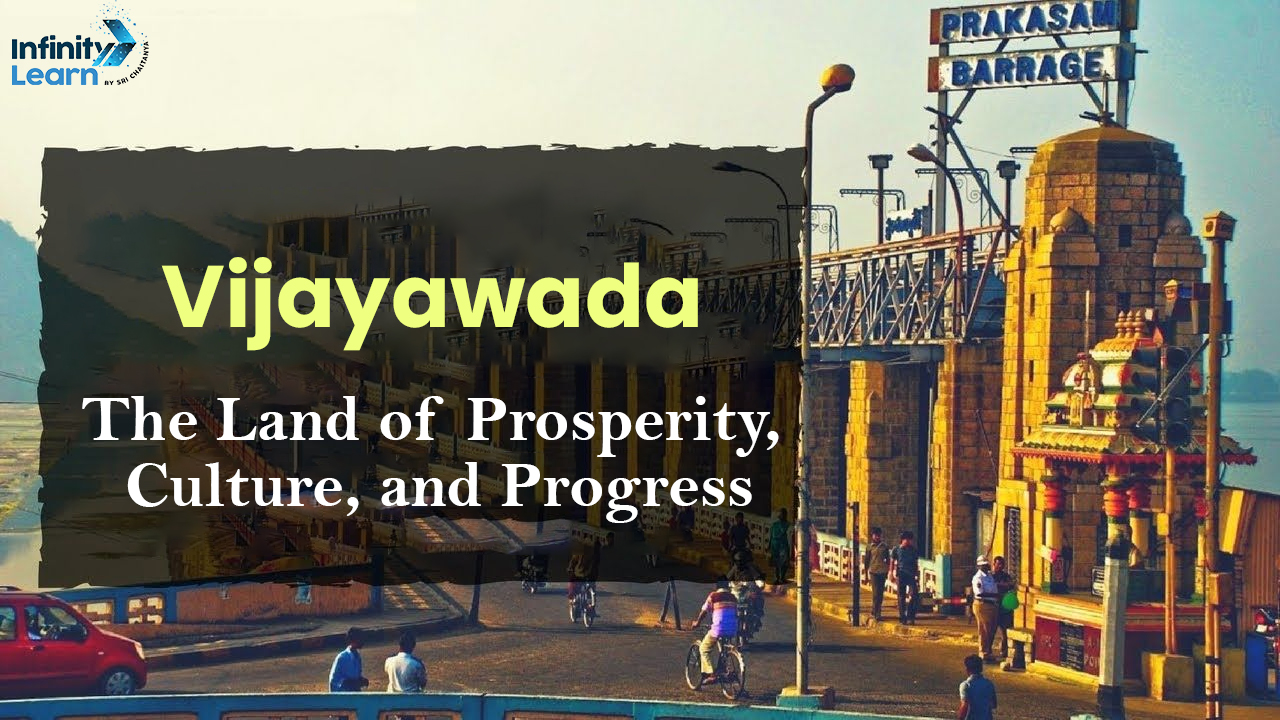
Courses

By Shailendra Singh
|
Updated on 16 May 2025, 14:43 IST
Vijayawada, often referred to as the “City of Victory,” is a bustling metropolis located in the southeastern part of India. It is the third-largest city in the state of Andhra Pradesh and serves as its commercial, political, and transportation hub. With a rich historical and cultural heritage, an ever-growing economy, and a vibrant way of life, Vijayawada is a city that offers a blend of tradition and modernity.

Vijayawada Andhra Pradesh is strategically situated on the northern banks of the Krishna River, which is one of the major rivers in India. The city’s geographical coordinates are approximately 16.5074° N latitude and 80.6469° E longitude. This favorable location not only contributes to the city’s scenic beauty but also plays a significant role in its economic and cultural development.
Vijayawada has a rich and diverse history that dates back centuries. The city’s name itself is a testament to its historical significance; “Vijaya” means victory, and “Wada” means place or settlement. The origin of the city’s name is linked to the legend of Arjuna, a character from the Indian epic Mahabharata. According to the Mahabharata, Arjuna is said to have performed penance here, leading to the city’s name being derived from his victory.
The region was ruled by various dynasties over the years, including the Satavahanas, the Chalukyas, the Kakatiyas, and the Vijayanagara Empire. The British East India Company took control of the area during the colonial period, and after India gained independence in 1947, Vijayawada became a part of the newly formed Andhra Pradesh state in 1953.
Vijayawada’s culture is a harmonious blend of Andhra culture, Telugu traditions, and a cosmopolitan way of life. Vijayawada Andhra Pradesh celebrates various festivals with great fervor, such as Sankranti, Ugadi, Dussehra, and Diwali. The famous Krishna Pushkaram festival, which takes place every 12 years, draws millions of devotees to take a holy dip in the Krishna River. The region is also known for its rich classical music and dance heritage, with Kuchipudi dance being a prominent art form.
The Telugu language is widely spoken and forms the backbone of communication in Vijayawada. Telugu literature and poetry have a long and esteemed history in the region, with renowned poets and writers like Gurajada Apparao and Sri Sri hailing from here.
Vijayawada has witnessed a remarkable economic transformation in recent decades. It has become a major commercial and industrial center, primarily due to its strategic location, excellent connectivity, and a robust entrepreneurial spirit. The city is a hub for trade, commerce, and manufacturing, and it plays a vital role in the state’s economy.

Vijayawada’s strategic location as a transportation hub is a key factor in its economic development. The city boasts an extensive network of roads, railways, and waterways, making it a critical junction for the movement of goods and people. Here are the major modes of transportation in the city:
Vijayawada boasts a plethora of attractions that cater to a wide range of interests. Whether you’re a history enthusiast, a nature lover, or a religious pilgrim, there’s something for everyone in this vibrant city. Some of the notable tourist destinations include:
Vijayawada is emerging as an educational hub, with a growing number of educational institutions offering diverse courses and programs. Among the well-known educational establishments in the city are:
Vijayawada has witnessed rapid urbanization and infrastructural development in recent years. The city has taken significant strides in improving its amenities and public services. Key infrastructure developments include:
While Vijayawada Andhra Pradesh has made impressive progress in various sectors, it also faces several challenges that need to be addressed for sustainable growth. Some of these challenges include:
Infrastructure Development: The city continues to need investments in infrastructure to keep up with its fast-paced growth.
The name 'Vijayawada' is derived from the Sanskrit words 'Vijaya,' which means victory, and 'Wada,' meaning place or settlement. Legend has it that the city was named after the victory of Arjuna, a character from the Indian epic Mahabharata, who is said to have performed penance in the region
Vijayawada's economy is diverse and multifaceted. The major sectors contributing to its economy include agriculture, textile and garment industry, education, healthcare, information technology, and manufacturing. The fertile Krishna Delta is renowned for agriculture, while the city's textile industry is famous for its cotton sarees
Vijayawada offers a variety of tourist attractions, including the Kanaka Durga Temple, Undavalli Caves, Prakasam Barrage, Bhavani Island, Mogalarajapuram Caves, Victoria Museum, Prakasam Public Park, Kondapalli Fort, and Rajiv Gandhi Park. These attractions cater to religious pilgrims, history enthusiasts, and nature lovers.
Vijayawada is exceptionally well-connected. It has a major railway junction, Vijayawada Junction, which is a vital link between northern and southern India. The city is also connected by a network of national and state highways, and it has a domestic airport, Vijayawada Airport, offering regular flights to major Indian cities. Additionally, the Krishna River provides a natural waterway.
Vijayawada is part of the Indian government's Smart Cities Mission, aimed at improving urban infrastructure and services. Ongoing development projects include the construction of an outer ring road, expansion of road networks, and the development of industrial parks and special economic zones (SEZs). Challenges facing the city include traffic congestion, pollution, and waste management, all of which are being addressed through various initiatives and investments.